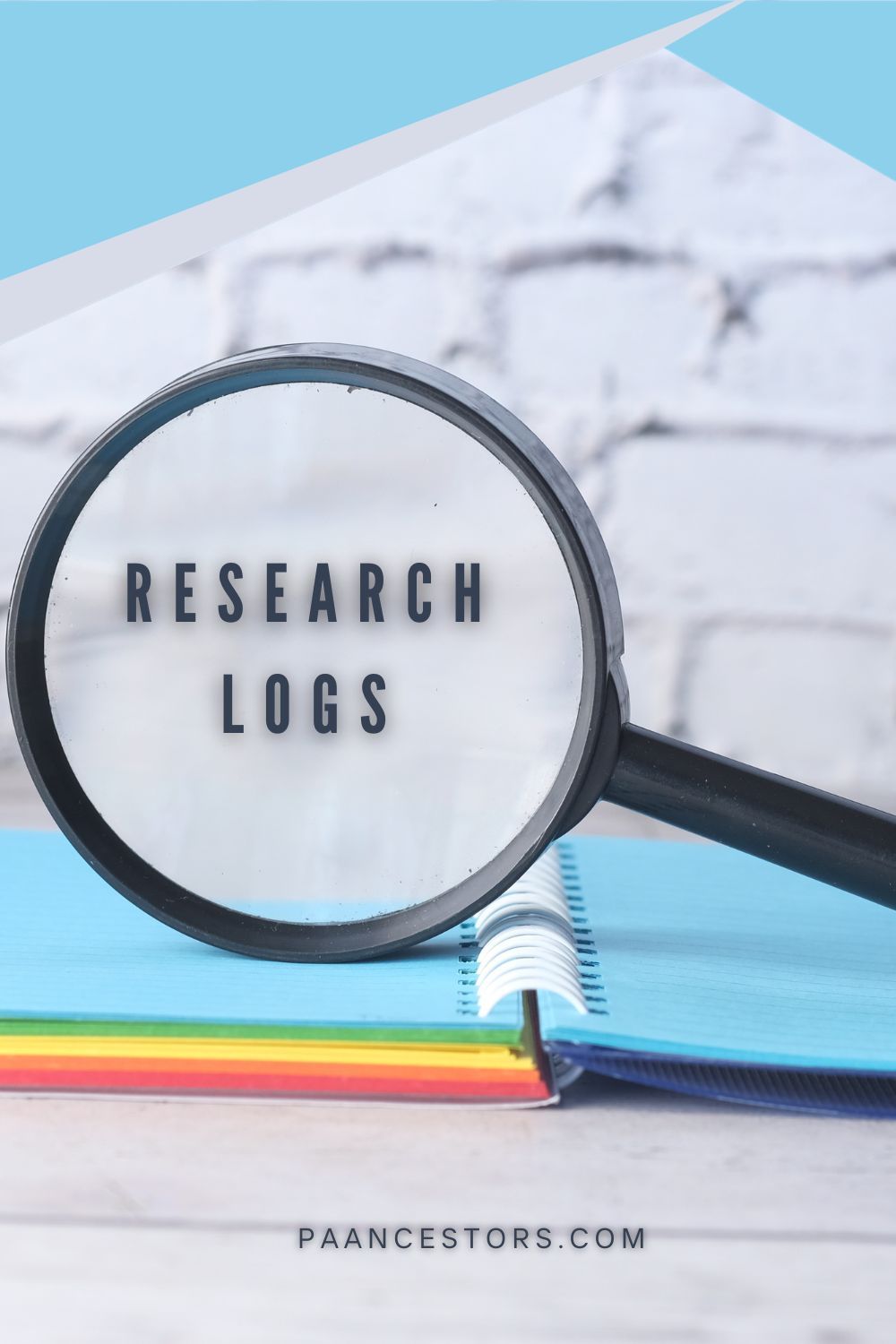Recording Your Genealogy Research with the Power of Research Logs
Stay on track with your genealogy by using research logs. This comprehensive guide describes how to set one up and why they are the most powerful tool for you to use.

To navigate the sea of records and documents, genealogists rely on research logs as an indispensable tool.
In this comprehensive guide, we will explore the value of research logs and using them in genealogy research in Pennsylvania. Get ready to unlock the secrets of your Pennsylvania roots!
Introduction
Genealogy research is a personal adventure that allows us to uncover the stories of our ancestors and connect with our roots. However, the research process is overwhelming with the vast amount of records and information available online and offline.
This is where research logs are essential.
Research logs are a handy tool that helps genealogists stay organized, plan their research, track their progress, and record their findings. By maintaining a research log, you can ensure that your research is thorough, well-documented, and easily accessible for future reference-both by you and future generations!
Understanding Pennsylvania History
Before embarking on your genealogy research journey in Pennsylvania, it is crucial to have a solid understanding of the state's history.
Pennsylvania, one of the original 13 colonies, played a pivotal role in the formation of the United States. From William Penn's establishment of the Pennsylvania colony as a refuge for religious freedom to its significant contributions during the American Revolution, the state's almost 350 year history is rich with stories waiting to be uncovered.

Getting Started with Genealogy Research in Pennsylvania
To begin your journey into Pennsylvania genealogy, it is essential to set clear research goals and objectives. Determine what specific information you hope to uncover and which ancestors or family lines you want to focus on. This will help you stay out of “rabbit holes” chasing curious details that do not related to your research.
Next, familiarize yourself with the available resources and repositories in Pennsylvania. The Pennsylvania State Archives is a valuable starting point, offering access to a wide range of records, including vital records, land records, military records, and more. Additionally, online databases such as Ancestry.com and FamilySearch provide convenient access to digitized records that can accelerate your research.
Pennsylvania is also known for its diverse population through out its history. Every genealogy researcher should know the ethnicity of an ancestor as a continuing point for research. Understanding the historical context of different waves of immigration can help genealogists trace their ancestors' paths back to their home country.
Creating and Organizing Your Research Logs
Creating a well-structured and organized research log is crucial for effective genealogy research.
Your research log should include essential components such as the researcher's name, the ancestor's name and years, the date of search, the place of research, and the purpose of the search. Additionally, you should record detailed information about the sources you searched, the scope of your search, and any significant findings or lack thereof.
Customize your research log to fit your specific research needs and preferences. There is no standard software to use to create your research log. Use the software that is easiest for you whether it be Word, GoogleDocs, Excel, GoogleSheets, AirTable or Notion. You can even use a physical notebook!
Whichever format you choose, make sure it is easy to navigate and allows you to update and add information easily.
My favorite research log is one I created in Notion. You can download a copy of it and try it yourself.
Organize your research log in a way that makes retrieval and reference effortless. Categorize your research by family lines, geographical locations, or specific research projects. This will help you quickly locate relevant information and identify any gaps in your research.

Conducting Effective Research
Conducting effective research requires careful planning and the utilization of a variety of sources.
Start by developing a research plan and based on a timeline of the ancestors’ locations. If you are new to creating a research plan, check out my simple plan in Three Steps in Making a Genealogy Research Plan.
Once you have a goal at the top of your plan, outline the specific records and repositories you intend to explore based on the ancestors’ locations. This will help you find the most relevant records fast.
When conducting genealogy research in Pennsylvania, you should utilize both primary and secondary sources.
- Primary sources include original records created at the time of the event, such as death certificates, marriage licenses, and baptismal records.
- Secondary sources, on the other hand, are records that provide information about an event but were created after the fact, such as family histories, county biographies, and newspaper articles.
In addition to traditional sources, take advantage of the Pennsylvania Historical and Museum Commission (PHMC) markers scattered throughout the state. These markers provide valuable historical context and can lead you to additional resources and records related to your ancestors.
Tracking Your Progress and Findings
As you conduct your research, it is crucial to track your progress and record your findings in your research log.
Document each source you search, noting the purpose of the search, any discoveries or lack thereof, and any additional insights or questions that arise during the process. This detailed record will not only help you stay organized but also allow you to easily refer back to previous research and build upon your findings.
Tracking negative evidence, or what you do not find, is equally important.
It helps you eliminate potential research paths and prevents you from duplicating efforts in the future. By noting where you have searched and found nothing, you can save time and focus your energy on other sources and avenues of research.

Analyzing and Evaluating Your Research
Genealogy research is not just about collecting information; it's about analyzing and evaluating the evidence you uncover.
As you review your research findings, weigh the evidence and consider the reliability and credibility of each source. Look for patterns, inconsistencies, and conflicting information that may require further investigation.
When analyzing your research, it is essential to consider the broader historical and cultural context of the time period in which your ancestors lived. Understanding the social, economic, and political factors that shaped their lives can provide valuable insights and help you draw accurate conclusions.
If you encounter conflicting information or discrepancies in your research, don't be discouraged. The most common conflicts are in people’s names and dates of events. My article “Best Practices to Resolve Name and Date Conflicts in Genealogy Research” will help you create a process to deal with these discrepancies.
The process of resolving conflicting information can lead to new discoveries and a more comprehensive understanding of your ancestors' lives.
Collaborating and Sharing Your Research
Genealogy research is often a collaborative endeavor, and sharing your findings with others can lead to exciting breakthroughs and connections. Engage with the genealogy community through online forums such as NGS Forum, Facebook groups, and local genealogy societies. See my comprehensive listing of every Pennsylvania genealogical society for contact information.
Share your research, ask for assistance, and collaborate with fellow researchers who may have expertise or knowledge in areas you are exploring.
In addition to collaborating with others, consider sharing your research with family members and distant relatives. Your findings may spark interest and lead to valuable connections with relatives you never knew existed. Sharing your research can also contribute to the collective knowledge of Pennsylvania and American genealogy.
Overcoming Challenges and Special Situations
Genealogy research is not without its challenges, and Pennsylvania genealogy is no exception.
Missing or incomplete records, conflicting information, and research roadblocks are common obstacles that researchers encounter. When faced with these challenges, remain persistent and creative in your approach.
If you come across missing or incomplete records, explore alternative sources and records that may provide indirect evidence or clues about your ancestors. The most popular alternatives are newspapers, court records, and tax records to fill in the gaps in your research.
And if you are unsure where to turn, ask an expert who researches in that location. Genealogists are happy to help other genealogists.
Now Go Start Your Research Log!
Genealogy research is a journey that allows us to uncover the stories of our ancestors and connect with our heritage. But it is too easy to get off-track and distracted given the millions of records on the internet (and the billions still off the internet!).
By utilizing research logs, tracking our progress, and analyzing our findings, we can navigate the vast sea of records and documents with confidence. Embrace even the negative findings of genealogy research, collaborate with fellow researchers, and share your research with others.
Together, genealogy researchers unlock the secrets of Pennsylvania's past and preserve the legacies of our ancestors for the future.
Happy researching!
© 2019–2023 PA Ancestors L.L.C. and Denys Allen. All Rights Reserved.
